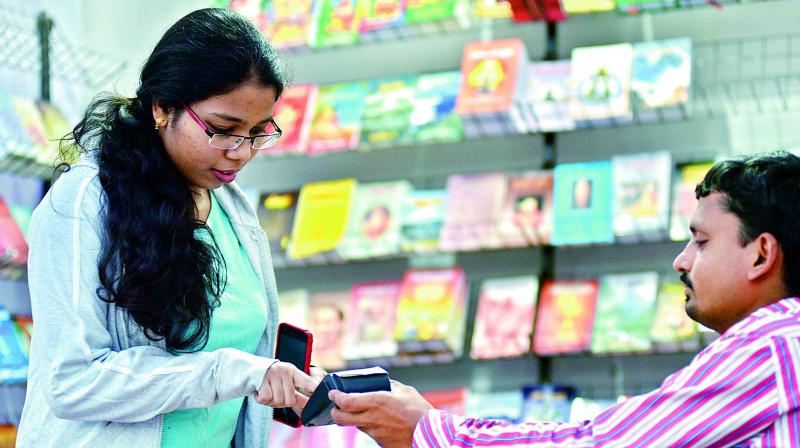Digital transactions are on decline in the country
There were 100 million fewer transactions in February 2017 compared to December 2016 at point of sale (PoS) counters through bank cards.

Visakhapatnam: The Union government’s ambitious plan to turn the nation into a ‘digital economy’, which was thought to have been accelerated post-demonetisation, has lost its steam with the number of credit/debit card, wallet and mobile transactions declining.
According to the Reserve Bank of India’s representative data of electronic payment systems, there were 100 million fewer transactions in February 2017 compared to December 2016 at point of sale (PoS) counters through bank cards.
The increasing availability of cash and taxes levied on card transactions has led to people eschewing digital platforms in favour of the more familiar cash transactions.
Even the higher penetration of PoS machines, ATMs, and mobile wallets, following demonetisation, have not helped increase the number of transactions in the ensuing months. A cursory look at wallet and mobile transactions is sufficient to understand how things have turned over time.
Mobile transactions have seen a drastic fall from 70 million transactions in December 2016, to 55 million transactions in February 2017. Wallet transactions have also witnessed a 20 per cent decline during the same period.
People ditch card payments
According to observers, the cash crunch was acutely felt in the aftermath of demonetisation and so people took to card payments, digital wallets and online transactions to cope with the situation despite the tax burden.
There were endless stories about the chaos and unprecedented rush at banks and harrowing stories about the difficulties the public experienced after demonetisation. But gradually, with the ready availability of cash, digital payment was back to square one.
Convenor of the United Forum of Bank Unions, CAS Prabhakar, said that the withdrawal of Rs 1,000 and 500 notes from circulation had initially given an impetus to digital transactions.
“We had also aggressively pushed consumers towards the digital economy by setting up more PoS machines and through other means. But now the digital economy initiative may have lost the initial enthusiasm. However, the declining numbers can be partly attributed to the lean months of January and February in terms of business,” Mr Prabhakar explained.
Founder and CEO, Cove Venture, and lead thinker and trainer of Rajbodh, a Hindu think-tank, Madhava Turumella, who has been touring India for the last one week, said, “It’s no more an electronic payment system in India. People are only transacting in cash. Nowhere are there app-based cashless transactions. Merchants are asking for payment in only cash form.”
B V Chandrasekhar, a financial analyst working with a stock broking company, points out that the majority of outlets still have no avenues for accepting digital payments.
“It has been a great challenge for the government to bring all the people of the country onto the digital economy platform. People have already started using cash for all transactions and ditched the card payments,” he said.
